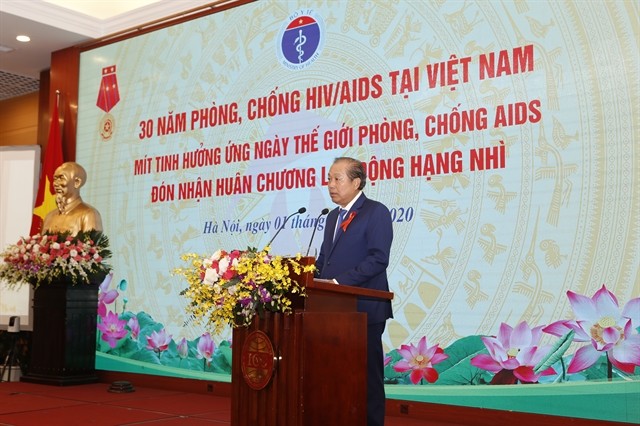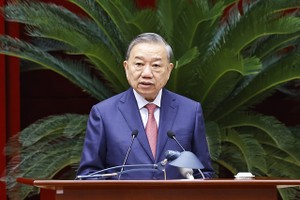
Speaking at the event, Deputy Prime Minister Truong Hoa Binhlauded Vietnam's achievements in the fight against the HIV/AIDS epidemic over the past 30 years, adding that the epidemic was still a threat to human health and affected economic and social development and the future of both nations and peoples.
Deputy PM Binh asked provinces and cities to allocate more investment in fighting the epidemic and develop plans on HIV/AIDS prevention and control and to integrate HIV/AIDS prevention into local socio-economic development plans.
Binh asked the health sector to bring into play all existing resources, expand the coverage and improve the quality of HIV/AIDS examination and treatment services, as well as improve harm reduction intervention, HIV counselling and testing, care and treatment.
He said the health sector should work to give the best possible conditions for people to access HIV prevention services, for people with high-risk behaviours to get early access to HIV testing and for HIV-infected people to access antiretroviral treatment early, while communication and awareness campaigns should be carried out to help put an end to discrimination against HIV/AIDS carriers.
Binh also suggested social organisations and communities participate in HIV/AIDS prevention activities.
US Ambassador to Vietnam Daniel Kritenbrink remarked that Vietnam was a success story in the fight against HIV/AIDS.
Since the beginning of the AIDS epidemic, Vietnamhad done an incredible job in mobilising international support, both financial resources and technical assistance, to deliver a variety of interventions, the US diplomat noted.
Vietnam had developed a robust social health insurance programme to promote the sustainability of HIV services through domestic financing. In 2018, the country achieved a key benchmark in transitioning the HIV response from donors to domestic resources – Vietnam assumed responsibility for funding, procuring and delivering anti-retroviral, or ARV, drugs to a third of all HIV patients in the country, he added.
“Vietnam is also a global leader in providing quality HIV treatment services through client-centred serviced delivery models and close collaboration with communities with HIV or affected by HIV. This is evidenced by very high viral load suppression rates, with 95 per cent of patients having an undetectable viral load. This is among the highest viral suppression rates in the world,” continued Kritenbrink.
Minister of Health Nguyen Thanh Long said that over the past 30 years, Vietnamhad implemented comprehensive and effective HIV/AIDS prevention and control activities.
“The HIV/AIDS epidemic in Vietnam has been gradually controlled and the rate of HIV infection in the community is below 0.26 per cent. In the past 15 years alone, we have prevented about half a million people from being infected with HIV and saved the lives of about 200,000 people who may have died from AIDS.
The Joint United Nations Programme on HIV/AIDS (UNAIDS) said that Vietnamwas one of four countries, along with the UK, Germany and Switzerland, to have a high quality of HIV/AIDS treatment in the world,” said Long.
The country now has about 10,000 new HIV cases and about 2,000 HIV/AIDS-related deaths yearly, compared to 30,000 new cases and 10,000 deaths in the previous 13 years.
A UNAIDS report also said Vietnam was the country with the largest decrease in the number of new HIV infections in 2018 (down 64 per cent compared to 2010).
At the event, participants heard that Vietnam still faced many challenges due to the HIV/AIDS epidemic. Each year, about 2,000 people die due to AIDS. There are still about 40,000 HIV-infected people living in the community without knowing their HIV status. HIV transmission through sex continues to increase, especially among men who have sex with men.
Experts said stigma and discrimination against HIV/AIDS had decreased but were still quite common, causing a barrier for people to access HIV/AIDS health services.
Vietnam has set a goal to basically end the AIDS epidemic by 2030 by having only 1,000 new HIV cases each year in the country. This means that the country will have to reduce new HIV infections cases by 10 times by 2030.
























